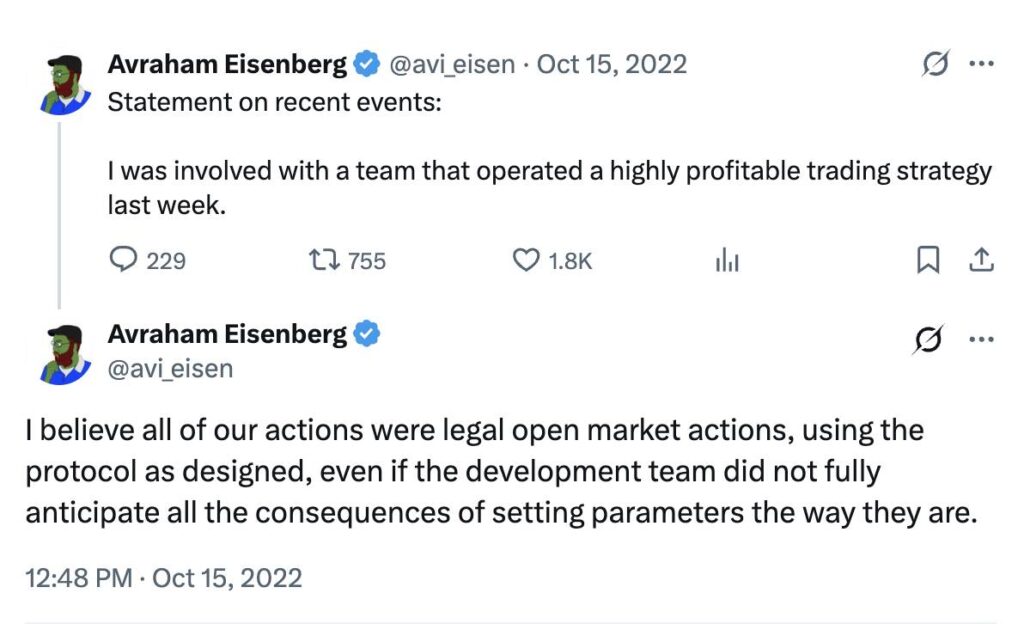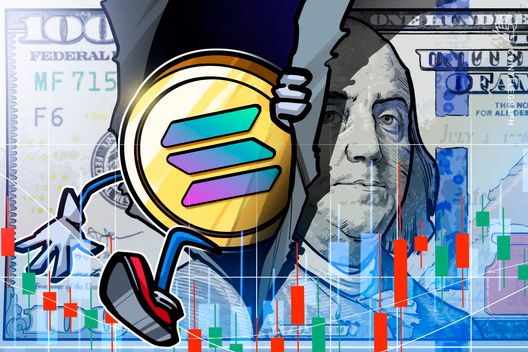In a significant development in the cryptocurrency landscape, Avraham Eisenberg has been sentenced to over four years in prison on child pornography charges, a case completely distinct from his involvement in the notorious 2022 hacking of Mango Markets. Eisenberg received a 52-month prison sentence at a hearing held on May 1 in the U.S. District Court for the Southern District of New York. This case had been set in motion with his indictment on fraud charges related to the Mango Markets incident, which resulted in a staggering loss of approximately $100 million in user funds.
Initially, Eisenberg was due for sentencing in July 2024 following his guilty plea on the charges of child pornography, but recent developments suggested that his sentencing for both cases might occur together in a consolidated hearing. However, as of the latest updates, the proceedings related to the fraud case remain pending, underlining the complexities of legal battles in the digital asset space.
“The prosecution in the Mango Markets case reflects the growing probability of apprehension for hackers and cybersecurity exploiters plaguing the crypto industry with malicious attacks on platforms and users,” a noted observer remarked.
Mango Markets, once a thriving decentralized cryptocurrency exchange, found itself at the center of controversy in October 2022 following an exploit that involved manipulating its pricing oracle, leading to a drastic 52% drop in the value of its native token, MNGO, within just 24 hours. In the aftermath, the exchange suspended deposits to mitigate further damage. Eisenberg defended his actions, framing the incident as a series of “legal open-market actions,” and claimed to have tried negotiating a settlement for the recovery of user funds after the exchange’s insurance fund couldn’t address the losses.
The repercussions of this case extend beyond Eisenberg’s actions, as the U.S. federal authorities have ramped up efforts to address the security challenges facing the cryptocurrency sector. Since his arrest in December 2022 in Puerto Rico, Eisenberg’s legal journey has been closely monitored, culminating in a jury finding him guilty of wire fraud, commodities fraud, and commodities manipulation in April 2024. His defense team contended that the exploit should not be classified as cybercrime but rather a strategic trading success.
As the cryptocurrency market continues to navigate the shadows of cyber threats and legal uncertainties, the Eisenberg case stands as a stark reminder of the risks involved in the digital asset realm. The strong responses from law enforcement reflect a renewed commitment to safeguarding users and their investments in an industry frequently accused of being fraught with exploitation and fraud.
Key Points on Avraham Eisenberg’s Sentencing and Its Implications
Avraham Eisenberg’s legal troubles reflect significant challenges in the cryptocurrency industry, particularly relating to security and regulatory measures.
- Sentencing Duration: Eisenberg was sentenced to 52 months in prison on child pornography charges.
- Mango Markets Exploit: He was involved in the exploitation of Mango Markets, leading to a loss of approximately $100 million.
- Fraud Charges: Eisenberg’s case includes pending fraud charges unrelated to the child pornography charges.
- Legal Arguments: His defense claimed that the exploit was a legitimate trading strategy, but he was ultimately convicted of wire fraud and commodities manipulation.
- Government Response: The sentencing illustrates increasing measures by law enforcement to tackle cybercrime in the cryptocurrency sector.
- Market Impact: The exploit caused a drastic drop in the value of Mango’s native token (MNGO), demonstrating how hacking incidents can directly affect investor sentiment and market stability.
The evolving legal landscape surrounding crypto exploitation highlights the importance of regulatory frameworks to protect users and maintain market integrity.
- Cybersecurity Awareness: Readers should be aware of the growing risks associated with cryptocurrency investments and the potential for exploitative actions that can result in significant financial losses.
- Legal Accountability: This case emphasizes the potential legal repercussions for individuals involved in malicious activities within the decentralized finance space.
- Importance of Caution: Investors should exercise caution and conduct thorough due diligence on cryptocurrency platforms to safeguard their funds.
Avraham Eisenberg’s Legal Predicament: A Deep Dive into the Impact on the Crypto Landscape
The sentencing of Avraham Eisenberg to over four years in prison for child pornography charges—separate from his notorious role in the Mango Markets exploit—shines a spotlight on the complex interplay of crime and the burgeoning crypto industry. While Eisenberg’s actions have undoubtedly raised alarms within the community, it also paints a broader picture of a sector grappling with security vulnerabilities and legal repercussions.
Advantages:
Eisenberg’s case is a prime example of how authorities are tightening their grip on fraudsters operating within the cryptosphere. As federal law enforcement ramps up its efforts to identify and prosecute malicious actors, this sends a clear message: hacking and exploiting platforms like Mango Markets will eventually lead to severe consequences. For investors and users of crypto platforms, these legal actions could enhance trust and ultimately contribute to a safer trading environment. Furthermore, it underscores the necessity for decentralized exchanges to bolster their security measures, which could foster innovation in protective technologies.
Disadvantages:
However, this case raises significant concerns regarding the perception of decentralized finance (DeFi). For users, a high-profile case associated with fraud could deter them from engaging with DeFi platforms, stifling growth in a space already susceptible to skepticism. Eisenberg’s defense, claiming the exploit was merely a “legal trading strategy,” showcases a troubling gray area that may embolden other would-be hackers, undermining the integrity of legitimate traders and developers. As the community grapples with its identity, there’s a risk that users may question the viability and security of their investments.
Who Stands to Benefit and Who Faces Challenges?
Traditional financial institutions and regulatory bodies may find a competitive advantage in the wake of Eisenberg’s case. By emphasizing security and reliability, they can attract wary crypto investors seeking stability. Conversely, DeFi platforms and emerging projects may find themselves scrambling to re-establish credibility and confidence among users, working harder to prove that their ecosystems are secure. By implementing enhanced compliance and security measures, these projects may either rise above the stigma or struggle further in a market that increasingly values transparency and trust.
Eisenberg’s situation, therefore, serves as both a cautionary tale and a high-stakes test for the future of decentralized finance, challenging the community to innovate while navigating the complex landscape of legality and ethics in crypto.













